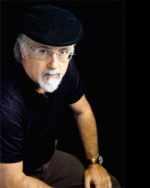

Member Since: 6/5/2007
Band Website: pieromarrasfansclub.it
Influences:
La rivista musicale "SONOS E CONTOS" dedica la copertina del numero di Novembre a Piero Marras. All'interno una lunga intervista rilasciata dal musicista nuorese al giornalista Giacomo Serreli.
Il 23 Novembre un piccolo paese della Sardegna "Atzara" ha conferito a Piero Marras la cittadinanza onoraria. L'artista,che ha dichiarato di tenere molto a questo riconoscimento, ha cantato "Atzara" (località nota come" il paese dei pittori) nella canzone Domos de pedra (case di pietra)
Il 30 Novembre ha preso il via al Teatro Civico di Sassari la rassegna "Occhio di bue" organizzata dall'Associazione Piero Marras Projects. La rassegna di quest'anno è stata dedicata ai chitarristi.
Clic for zoom
Fans Club
Sounds Like: Piero Marras informations
Piero Marras was born in Nuoro, but his origins track back to Sassari and Cagliari received him with open arms. He is referred to as one of the forerunners and exponents of the Sardinian ethnic music movement. However, many of his lyrics are written in Italian, like those written in his early years. His lyrics achieved widespread success among the public and were awarded several prizes. His artistic debut dates back to the release of "Fuori Campo" on Sept. 1978, published by EMI music label. The first CD was a watershed between his past and future works, marked by the participation in Renzo Arbore’s cult tv programme “L’altra Domenicaâ€, where Piero Marras sang his major hit “Diglielo tu Mariaâ€, a mixture of committed and popular music. In 1980 his second release was published, “Stazzi Unitiâ€, whose title made a veiled hint at his motherland. The CD was soon a major hit. In 1982 his third album “Marrasâ€, containing “Quando Gigi Riva Tornerà â€, was awarded the “Vela d’Argento†at the International Music Exhibition in Riva del Garda. Piero Marras successfully blended a revisited traditional sound with the ancient Sardinian language. Indeed, he defines himself as a “cinghiale†(wild boar), which can sniff and dig up the deep roots of Sardinian traditional values, chants and poems. In 1985, the lyrics of his major release “Abbardente†became bearer of his message. "Abbardente" (Burning water) is one of the first and main examples of Mediterranean world music. Two years later "Funtanafrisca" (Spring water) was released, a collaboration with journalist Paolo Pillonca, where social issues were translated into music.
Poetry becomes a means of analysis of local reality, of its joys and sorrows. “Osposidda†and “Domos de pedra†are two clear examples. In 1988 “Piero Marras in concertoâ€, his first live album, was published. In 1995 â€Tumbu†was released, containing a tribute to Maria Carta, “Sa oghe ‘e Mariaâ€, and to Franceschino Satta, “Bae lunaâ€. Peace, love, old conflicts and children are at the heart of his production, which is why he deserves due attention. For these reasons, primary schools in Sassari made his works part of the teaching of local traditions. In 1997 a new edition of his first album, “Fuori Campoâ€, was published, with two new bonus tracks: “Si Deus cheret†and “Notte lituanaâ€. In 1998 he performed in Cuba during the "Ichnos" meeting. In 1999 Soter music label published his first biography, “L’artista e il cinghiale†(The Artist and the Wild Boar), edited by Antonello Musu. During the same year, he wrote a new song for Andrea Bocelli’s hit album "Sogno", entitled “A volte il cuoreâ€. In the year 2000 he recorded “Sa 'oghe 'e Maria†(Mary’s Voice) in collaboration with Dionne Warwick and they both performed at the Nervi Hall in The Vatican City. Their performance was broadcast worldwide on Canale 5. In 2001 his eighth album, “In su cuile ‘e s’anima†(In the fold of the soul), was released, containing the duo with Dionne Warwick. In May 2001 the “Sindacato dei Giornalisti Cinematografici Italiani†(Italian Movie Journalists Union) gave him a nomination for the “Premio Nastro d’Argentoâ€, granted to his song "Anghelos", played as the sondtrack of Antonello Grimaldi's movie, "Un delitto impossibile". In July 2001 he was awarded the Golden Record for his single “Sa oghe‘e Maria†and received it from the very hands of soul music queen Randy Crawford in Porto Cervo (Italy). In January 2003 his first “greatest hits†was published. It was entirely sung in Sardinian and entitled “B’est†("there is" in Sardinian language). In March 2002, he was awarded the “Ignazio Silone†International Award for “the high cultural value of his production in Sardinian languageâ€. The same prize was awarded to Italian politician Marco Pannella and journalist Aldo Forbice. In July 2002 Italian journalist and writer Beppe Severgnini included Piero Marras’s name in his Best Italian Artist Top 20, published by the Italian newspaper "Il Corriere della Sera". “Fuori Campo by Piero Marras is amazing and useful to better understand Sardinia". In 2004 “L’ultimo Capo Indiano†was published, a compilation in Italian language containing all his major hits between 1978-1982 plus two unpublished works: “Una vita di più†and “Basta chiudere gli occhiâ€. The recent DVD “Piero Marras†portraits the artistic development of this Sardinian singer and composer, who proved that nowadays there is still room for those good old values that made poeple chant and hope for a happy ending.LIVE.......
Record Label: unsigned
Type of Label: Major